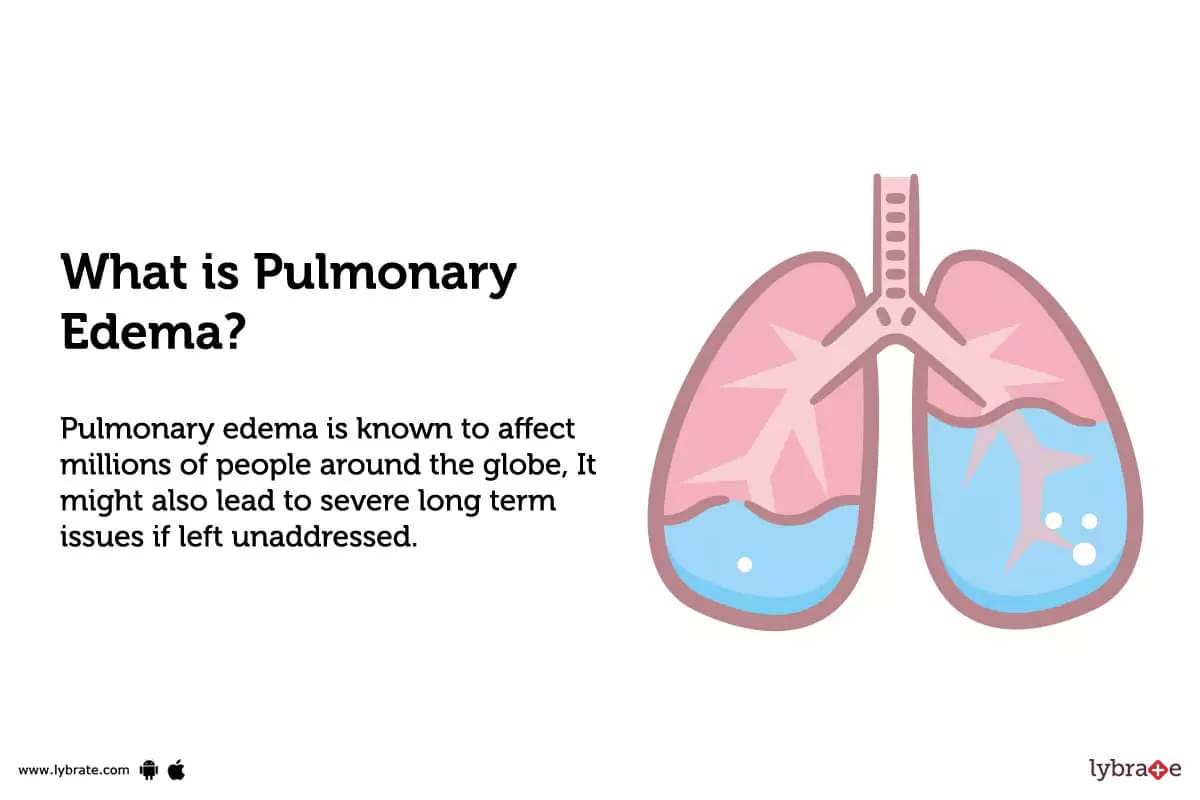Pulmonary Edema: Causes, Symptoms, Treatment, and Cost
Last Updated: Jul 07, 2023
What is Pulmonary Edema?
Pulmonary edema is known to affect millions of people around the globe, It might also lead to severe long term issues if left unaddressed.
A disease known as pulmonary edema is brought on by an excess of liquid in the lungs. Breathing becomes challenging because of the fluid buildup in the lungs' multiple air sacs. Heart issues are typically the root cause of pulmonary edema. But there are other causes for liquid to build within the lungs.
Types of pulmonary edema
Following are the types of pulmonary edema:
Long-term pulmonary edema
Signs and symptoms of long-term (chronic) pulmonary edema
- Waking up during the night with coughing or sense of being out of breath that can be eased by sitting up
- Respiration difficulties when active or when sleeping down
- Exhaustion
- More difficulty breathing when exercising
- Bad and new cough
- Sudden gaining of weight
- Inflammation in the foot and legs
- Breathing hard
High-altitude pulmonary edema
Adults and kids who go to or workout at high elevations are susceptible to HAPE. The following symptoms and warning signs are comparable to those of acute pulmonary edema:
The following symptoms and warning signs are comparable to those of acute pulmonary edema:
- Headache, which could be the initial sign
- Breathlessness during exercise, followed by breathlessness during rest
- Having trouble exercising as much as you used to
- initially, a dry cough
- Afterwards, a cough that discharges frothy sputum that may appear pink or contain blood
- A rapid heartbeat (tachycardia)
- Weakness
- Heart problems
- Little fever
- Elevated pulmonary edema (HAPE) symptoms typically worsen at night.
What is the difference between pulmonary edema and pleural effusion?
The pleura, the membrane that surrounds the lungs, can become abnormally fluid-filled, which is known as a pleural effusion. There is often just a minimal border of liquid within the pleura, which is located between the lungs as well as the interior of the thoracic wall.
Common causes of pleural effusion include cancers or tumors, congestive cardiac failure and pneumonia. The fluid, which might squeeze the lungs because they are porous, lies outside of the lungs, opposing pulmonary edema.
What is the difference between pulmonary edema and pneumonia?
Pneumonia and pulmonary edema entail an accumulation of liquid in the chest. Pneumonia is brought on by an infection. The infection could be microbial, fungal, or viral. The bronchi may get filled with contaminated fluid due to such organisms.
Pulmonary edema is not caused by an illness, and the liquid is usually thin.
What are the symptoms of pulmonary edema?
Symptoms of pulmonary edema might have rapid evolution or grow over time. Each kind of pulmonary edema determines the manifestations.
Symptoms of pulmonary edema that appear suddenly:
- Respiratory problems (dyspnea) or severe breathing difficulties that gets much worse with moving about or when sleeping
- A worsening sense of suffocation or sinking while lying down
- Coughing which discharges blood-possibly-containing foamy sputum
- An irregular, fast pulse (palpitations)
- Stress, agitation, or a sense that something negative is going to occur
- Damp, frigid skin
- Gasping for oxygen or wheezing
What causes pulmonary edema?
Heart problems are frequently the primary reason for pulmonary edema. Pneumonia, sensitivity to specific chemicals and medicines, and living at a higher altitude are some additional factors.
The signs and symptoms of pulmonary oedema can emerge quickly or gradually, depending on the etiology. Breathing problems can range from mild to severe. Other signs include weariness, difficulty breathing, and coughing.Oxygen therapy and medicine are frequently used as treatments. There are numerous pulmonary edema causes. There are two types of pulmonary edema, based upon where the issue first arises.
Cardiogenic pulmonary edema is the term for pulmonary edema that is brought on by a cardiac condition. The most typical cause of the fluid accumulation in the lungs is a cardiac problem. Noncardiogenic pulmonary edema is lung edema that is not caused by the heart.
Occasionally, both heart issues and non-heart issues might contribute to pulmonary edema.
Learning how the heart and lungs interact might partially explain why pulmonary edema might develop.
How to diagnose pulmonary edema?
Pulmonary edema can be diagnosed if it is identified at the right time.
An inspection will be done by a medical professional to check for chest fluid. They'll use a stethoscope to listen to the lungs and heart. They'll check you over for:
- Elevated or reduced blood pressure or heart beat.
- Faster breathing rate.
- Unusual heartbeats.
- Whistling or snapping noises coming from the lungs
- The body is swelling.
- Dark or blue skin color.
How to prevent pulmonary edema?
Pulmonary edema might sound like a complex disease but it can be prevented with time
By controlling preexisting lung or cardiovascular diseases and living a well-balanced lifestyle, you may be able to prevent pulmonary edema. For instance, lowering blood pressure and cholesterol levels can lower the likelihood of heart disease. Use the advice below to maintain cardiovascular health:
- Consume a diet high in fruits, veggies, cereals, dairy products with minimal or no fat, and a range of proteins.
- Avoid smoking.
- Exercise frequently.
- Cut back on liquor and salt.
- Stress management.
- control your weight.
Is pulmonary edema deadly?
Pulmonary edema is curable by medicines although it can also be hazardous.
Pulmonary edema can cause a person's death if left uncatered.
Pulmonary Edema Treatments
The situation of pulmonary edema is critical. If you develop abrupt (acute) pulmonary edema, treatment should be started right away. You might require care in an intensive care unit (ICU) or the emergency department (ER) (ICU).
Options for treatment involve:
- oxygen that is given by nasal prongs.
- devices that use a facial mask to pump air into the lungs.
- respirators or ventilation systems that supply air by forcing a pipe in the windpipe.
- medicines which boost the heart or make you pee more frequently to eliminate fluid.
- If congestive cardiac failure is not the reason of the pulmonary edema, other drugs may be used, like steroids & antibiotics
What is the best treatment for pulmonary edema?
Regarding patients suffering from pulmonary edema, treatment objectives involve symptom relief and therapy of the actual pathologic disease.
The most frequently prescribed drug is furosemide, and diuretics continue to be the treatment's mainstay. While larger levels are linked to a temporary impairment of kidney function, they are also linked to a greater reduction in dyspnea.
Can pulmonary edema be cured?
Medical help can save a person from the hazard of pulmonary edema.
Bad pressure in the lungs results from attempting to inhale through a clogged larynx. Most patients suffering from this type of pulmonary edema recover in around 24 hours with medication.
How to treat pulmonary edema at home?
The following can be carried out to cure pulmonary edema at home:
- Eating a nutritious diet that is balanced and includes fruits, vegetables, whole grains, and foods high in potassium and magnesium
- If your daily sodium intake is more than 2,000 mg, you should cut back.
- Avoid smoking and visiting areas that are heavily polluted or where there is haze everywhere.
- Alcohol and narcotics must not be consumed because they are damaging to the health.
- Exercise must be done between breaks.
- being well-rested; having enough sleep.
Which medications can cause pulmonary edema?
TNF IV radiographic contrast agents, methotrexate, protamine, tamoxifen, carbamazepine, cytarabine, erythromycin, and hydrochlorothiazide are all drugs that can cause pulmonary edema.
Which doctor to consult for Pulmonary Edema?
Here are a list of specialists you can consult for pulmonary edema
- Cardiologist
- Primary Care Provider (PCP)
- Critical Care Doctor
- Pulmonologist
- Emergency Medicine Doctor
Which are the best medicines for Pulmonary Edema?
Diuretics:Medications, like furosemide (Lasix), lower the hypertension in the lungs and heart resulting from excess fluid.
Medications for high blood pressure. These aid in the management of low or high blood pressure, which could also happen in pulmonary edema.
Inotropes: These are the drugs which enable your heart muscles to beat faster or slower, depending upon if the inotrope is positive or negative.
Morphine (Infumorph, MS Contin, etc).
Some major medicines which are widely used to cure Pulmonary edema include:
- Furosemide
- Bumetanide
- Lasix
- Bumex
- Edecrin
- Ethacrynic Acid
- Sodium Edecrin
How long does it take to recover from Pulmonary Edema?
Many persons with this form of pulmonary edema recuperate within 24 hours with treatment.
Are the results of the treatment permanent?
Luckily Pulmonary edema is curable and reversible. If it is treated on time, it gets cured permanently.
Who is eligible for the treatment?
Patients who suffer from chronic heart failure or show the symptoms of pulmonary edema like respiratory problems, coughing, fast heartbeat etc.
Who is not eligible for the treatment?
Patients who do not show acute symptoms of pulmonary edema are not eligible for the treatment.
What are the post-treatment guidelines?
- Keep your blood pressure in check.
- Monitor any other medical issues.
- Eliminate the source of the problem
- Quit smoking.
- Consume minimal salt.
- Pick a good nutritious diet
- Control your weight.
- Get some exercise on a regular basis.
What is the price of Pulmonary Edema treatments in India?
Pulmonary edema treatment is quite affordable in India. Patients can easily get cured.
The cost of a doctor's visit ranges from Rs 500 to Rs 900, and in certain major cities, it might reach Rs 1200.
Pulmonary Edema - Outlook / Prognosis
The reason determines the outlook. The recovery process could be swift or gradual. Some patients could require long-term usage of a breathing apparatus. This illness poses a risk to your health if it is not addressed.
Given the enormous array of cardiogenic and non-cardiogenic aetiologies of pulmonary edoema and its distinct mortality data, prognosis forecasts are challenging to evaluate. The results of severe pulmonary edema in ARDS have steadily improved. Nevertheless, public education continues to be the foundation in lowering the likelihood of coronary disease and the later growth of pulmonary edema and heart attacks.
Table of content
15+ Years of Surgical Experience
All Insurances Accepted
EMI Facility Available at 0% Rate
Find Pulmonologist near me
Ask a free question
Get FREE multiple opinions from Doctors


